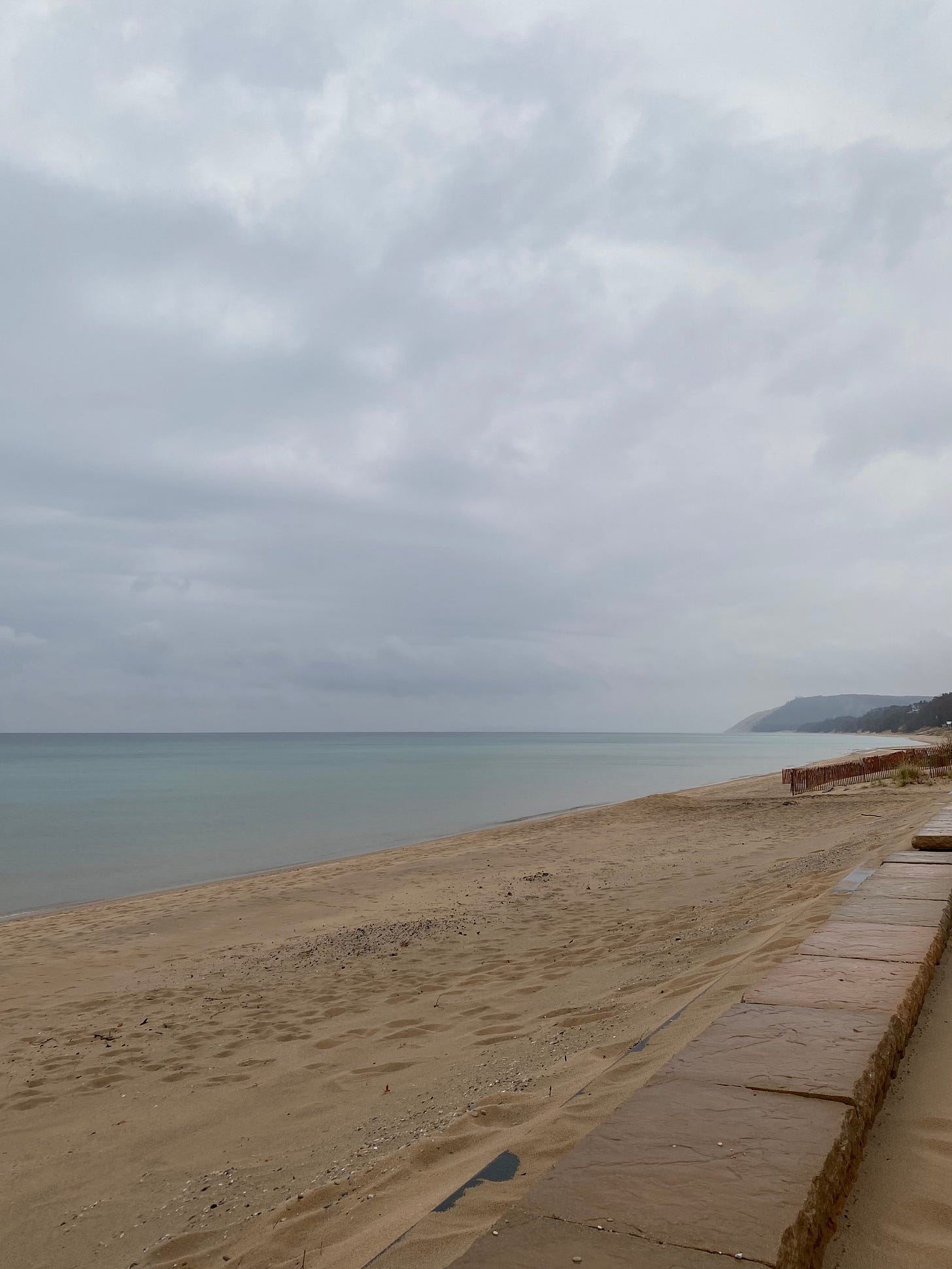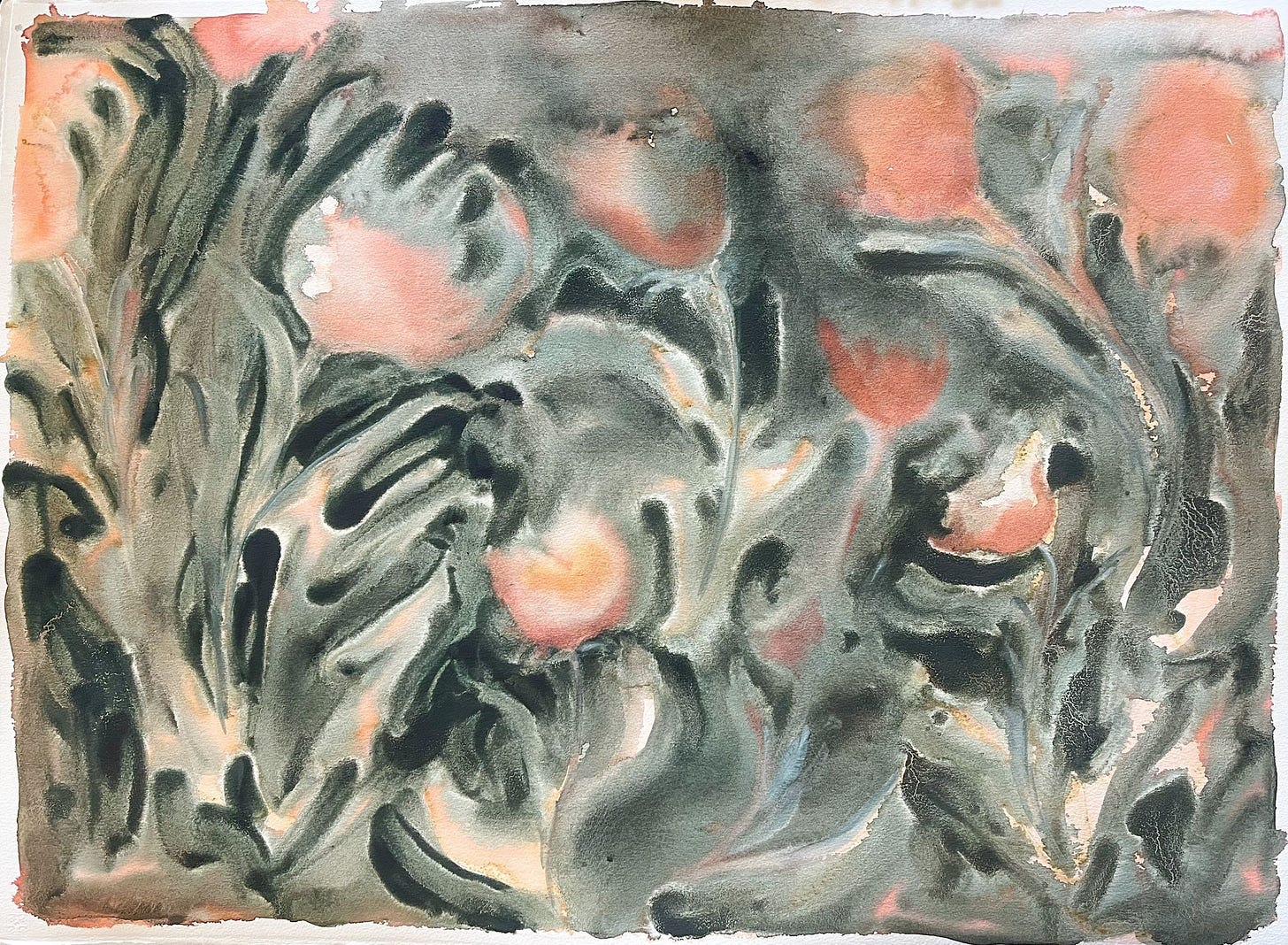The Honorable Harvest: Reflections
Shifting to a worldview of reciprocity, swim club details, and more!
Swim Club
Some of you have mentioned an interest in joining for winter swimming club in northern Michigan! I will do my best to send out newsletters weekly on Tuesday with information for Wednesdays swim for those who would like to join us, as it changes based on the wind forecast.
Tomorrow, Wednesday, November 22, we will be meeting at 9:00am in Empire near the lighthouse. If you haven’t done a cold dip before, we’ll offer lots of encouragement and helpful tips. Note that cold swimming is not recommended for those with heart problems, untreated high blood pressure, or for those who are pregnant.
Wear your swimsuit with some easy on/off warm clothes. Bring a robe or large coat to put on after, a towel/blanket, and warm drink. Neoprene gloves and booties are recommended, and it’s recommended to wear a knit beanie when we go in to keep your head warm.

The Honorable Harvest
Shifting to a worldview of reciprocity
Earlier this month, I attended a lecture by Dr. Robin Wall Kimmerer entitled "The Honorable Harvest." The lecture referenced the Indigenous wisdom of responsibility and reciprocity in how humans interact with the land around us. She advised that this mentality requires a shift from viewing the world as a resource to be extracted from; that it asks us to engage in a relationship with the land we live on. In the chapter “The Honorable Harvest” fromher book, Braiding Sweetgrass, she writes:
"We need acts of restoration, not only for polluted waters and degraded lands, but also for our relationship to the world. We need to restore honor to the way we live, so that when we walk through the world we don't have to avert our eyes with shame, so that we can hold our heads up high and receive the respectful acknowledgment of the rest of the Earth's beings."
The Honorable Harvest requires a shift from asking "what can we take" to asking "what can we give?" How can we reciprocate the gifts of the Earth with our own gifts, and how can we share what we collect? How can we honor those we inhabit the earth with?
As I write this essay, we enter Thanksgiving week in what is now known as the United States. I did not plan on this timing for when I would write this essay, but I acknowledge it because it invites acknowledgment of the complicated history of Thanksgiving.
No, not complicated. We use that word when we want to hide atrocities that implicate us; when we want to look away. The history of Thanksgiving and the colonization of this land is heinous. The truth is not complicated, and we cannot look away. Every year that the Earth suffers from our over-extraction and abuse reveals our need for Indigenous teachings of reciprocal relationship with the land.
Looking back on this past summer, I deemed it The Berry-Picking Summer. I hope it is the first season of a lifetime guided by foraging the gifts of the Earth. As I wait for the return of wild edibles in May, I plan to learn from the guidance of ancient reciprocity practices. As a descendant of Europeans who moved to the States sometime in the last few hundred years, I am learning ideas outside of my history, outside of the doctrines of colonization and greed, where the land was viewed as a resource, a commodity to conquer. We all have the opportunity to do this work, to learn new ways of viewing the world, and to pass better wisdom onto our children. We can work to learn the names of what our ancestors clear-cut; can fight to protect the waterways our governments still misuse.

Standing in the berry patches this summer, I felt interconnected with the plants in a way I have never experienced. Throughout my life, I have felt traces of it–while standing in the raspberry bushes growing in my childhood garden, the strawberries grown in raised beds behind a co-op house–but this summer while standing in a blueberry patch gone wild or picking endless blackberries on Alligator Hill, I felt a different gratitude for the gifts of the Earth, one that felt weighty with responsibility. Perhaps it was knowing that standing in the berry patch with my children instilled essential values in them. Whatever it was, listening to Dr. Wall Kimmerer talk about the Honorable Harvest earlier this month lit something in me, a call back to the core of what it means to be human, to be a part of cooperative community.
The day after listening to her lecture, I attended a viewing of the film "The People and the Olive: The Story of the Run Across Palestine." The Traverse City-based non-profit On the Ground filmed the project in 2012, and it follows the story of a handful of folks from Northern Michigan who ran across the West Bank in Palestine, planting olive trees along the way.
There are olive groves in Palestine that are over 3,000 years old, with families that have tended the same farms for generations; hundreds of years. Over the last 75 years, farmers have faced increasing hardships from Israeli settlers, with their olive groves being burned and destroyed, along with other attacks. The film raised awareness for the struggle of the farmers, and it was truly incredible to witness the resilience and hospitality of the Palestinian people in the face of crimes committed against them and their fields.
At the film's end, the Palestinian farmers honored the runners from the States by dedicating trees to them. One of the runners explained that these trees are hundreds of years old, and are considered family members by the farmers. To have a tree dedicated to each runner was an immense honor. I couldn't help but think of Dr. Wall Kimmerer's thoughts the day before, the invitation from the Honorable Harvest to view the land as home, as family, not a resource to be extracted from, but rather, an entity to commune with. These Palestinian farmers were doing that amidst great struggle.
The olive harvest typically happens now, and it has been a fraught year. Settler violence in the West Bank has increased, emboldened by the bombardment in Gaza. All that land that has been cared for by these people for generations, destroyed.
It brings to mind Wendell Berry's poem "The Objective," which speaks to what is lost in all our "progress." Not that we would consider the occupation of Palestine by Israel progressive, but in some ways, we are expected to take it as such. Those in power like to say, "You don't understand what's going on here; you don't understand war," as a means of quieting us. But perhaps I agree with their statement. I don't understand war, not because it is over my head, but because it is counter to the worldview I choose to inhabit. Berry writes–
Even while I dreamed I prayed that what I saw was only fear and no foretelling,
for I saw the last known landscape destroyed for the sake
of the objective--the soil bulldozed, the rock blasted.
Those who had wanted to go home would never get there now...
The once-enslaved, the once-oppressed,
were now free to sell themselves to the highest bidder
and to enter the best paying prisons in pursuit of the objective,
which was the destruction of all enemies,
which was the destruction of all obstacles...
which was to clear the way to self-realization, to self-creation,
from which nobody who ever wanted to go home would ever get there now,
for every remembered place had been displaced;
every love unloved,
every vow unsworn,
every word unmeant
to make way for the passage of the crowd of the individuated,
the autonomous, the self-actuated, the homeless with their many eyes
opened toward the objective which they did not yet perceive in the far distance,
having never known where they were going,
having never known where they came from.
Excerpt from The Objective by Wendell Berry
We must know where we come from to know where we are going. We must allow ourselves to reconnect to the gifts of the Earth so that we can reconnect with ourselves and each other. The disconnect is intentional; the less we see ourselves connected the easier it is to inflict harm, to rationalize it.
It may be that one of the greatest act of resistance to become connected to the dirt under our feet. There, we will learn what it means to be reciprocal, to believe that there is more than enough to go around–when managed well.
As I learn to operate more from this changing worldview–one that challenges many of the ways I live–our interconnectedness becomes increasingly apparent. While in the berry patch in August or spreading milkweed seeds in November, I remember that every gift must be tended with responsibility. Every gift requires an offering of something in return.
This responsibility invites me to do what I can to protect the Earth from the degradation that results from greed, colonization, and my own need for convenience. This struggle for restoration of the Earth is intimately connected with the fight for oppressed people, those whose farmlands are being destroyed, those who are being forced out of their homes, those who are cut off from essential resources like water and food. The land under my feet still echoes the heartache of what happened when this land was initially settled, a call-and-response to the heartache happening now in Palestine. All of it is connected.
Some Resources for Shifting Worldviews & Grounding into the Earth
Read Robin Wall Kimmerer’s book “Braiding Sweetgrass”
Watch the full film,“The People and the Olive: The Story of the Run Across Palestine.”
Read Angela Davis’ “Freedom is a Constant Struggle”, or listen to it now on Spotify.
Purchase olive oil made with olives grown in the West Bank from Canaan Palestine.
“Fire Flowers” Event: December 2
I am honored to be reading an original story at my friend Alyssa Smith’s next collection release, entitled “Fire Flowers”. The collection features ceramics, as well as watercolor and oil paintings. The event will take place on Saturday, December 2, in Elk Rapids, Michigan, hosted by Kelsey Duda of Fernhaus. Doors open at 3:30pm with refreshments and a chance to view the collection. Programming will begin around 5pm, with information about the collection, followed by a reading by me and music by Ty Maxon .
Tickets are $30 and on sale now! We hope you'll join us for a beautiful afternoon.
Site-wide Holiday Sale is on now!
Enjoy 20% off all products on the Lake Letters website until the end of November. My book “Lake Letters” along with various poem prints are the perfect gift for friends and family who are connected to the beauty of the Great Lakes region.
Use the code GIVE23 for 20% off now.
Wishing you all a safe start to your holiday season. May you consider the ways you can offer a gift of gratitude back to the Earth who sustains us, and also find connection with those around you. Thank you for reading and subscribing!
Mae








Thanks for your voice , Mae 🌿🍉💪🏽